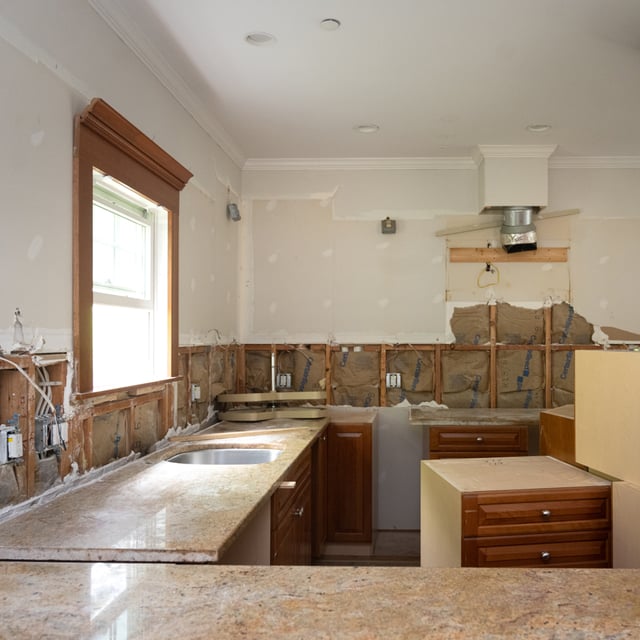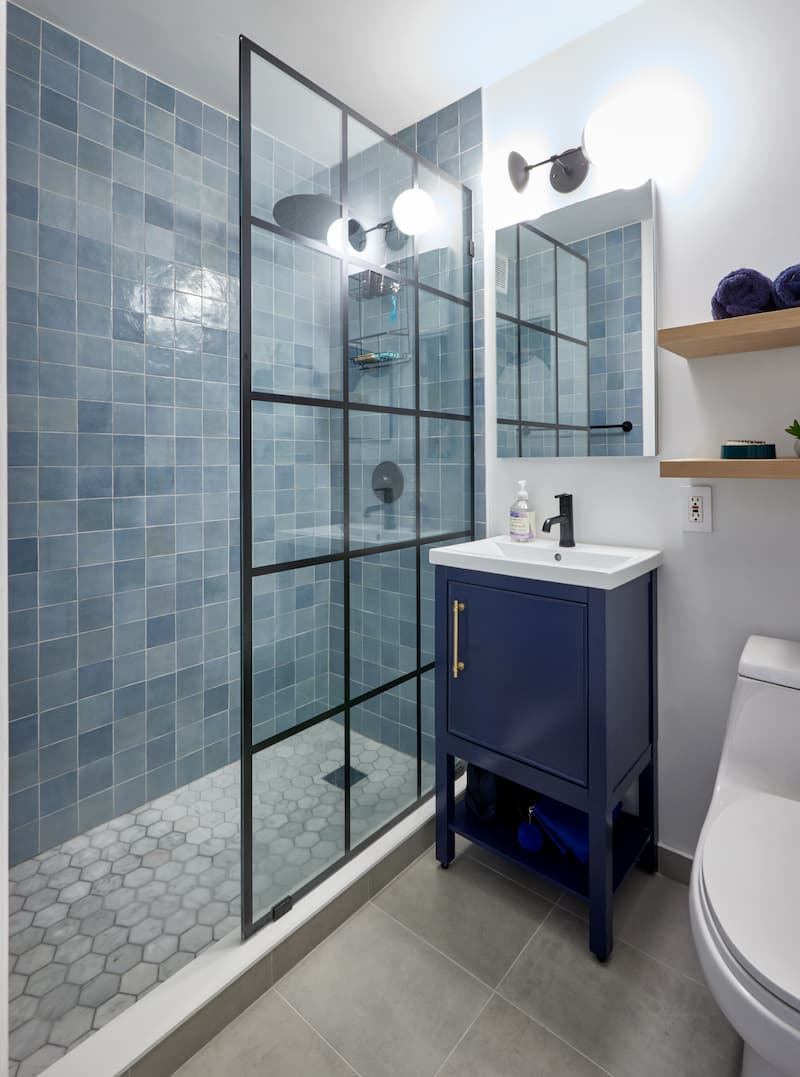Renovate or Move - Calculating & Comparing Costs

In This Article
Deciding whether to renovate your current home or move to a new one is a big choice—one that goes far beyond dollars and cents. While cost is a major factor, your decision also touches on lifestyle, community, convenience, and the emotional connection you have to your space.
Still, finances should significantly factor into your decision. Understanding the true costs—both seen and unseen—can help you weigh your options with clarity and confidence. Below, we’ll break down the real expenses of moving, compare them to the average costs of popular home renovations, and share the key questions to ask yourself as you decide whether to remodel or move.
How Much Does Moving Cost?
Consider a common scenario: the starter home you bought in your late 20s no longer fits your needs. Your family is growing, and it’s time to look for more space—extra bedrooms, another bathroom, maybe even a backyard.
The appeal of moving is real. But the cost goes far beyond the listing price of your next home. Relocating comes with a layered set of expenses—some predictable, others less so. Here’s what to factor in before making the leap:
- Real Estate Agent Commissions: Typically 5–6% of your home’s sale price, though these policies are currently in flux.
- Closing Costs (Selling): Usually 1–3% of the sale price, covering attorney fees, transfer taxes, and more.
- Closing Costs (Buying): Another 2–5% of the purchase price, including lender fees, title insurance, and escrow.
- New Mortgage Fees: Taking out a new mortgage often comes with origination fees, application fees, and points, which can add up to 1–2% of the loan amount. You may also face higher interest rates depending on market conditions and your credit profile.
- Moving Expenses: Professional movers cost an average of $1,500–$3,500 for a local move, and $4,000–$10,000+ for long-distance moves, as calculated using Moving.com .
- Temporary Housing or Storage: If your move-in and move-out dates don’t align, you may need to pay for storage or short-term rentals.
- Home Repairs & Staging: Prepping your current home for sale can cost $2,000–$5,000 or more, depending on repairs and staging needs.
- New Furniture & Decor: The average amount homeowners spend to furnish a new house is $16,000.
- Utility Transfers & Deposits: Setting up new utilities and services can add a few hundred dollars.
- Inspection & Appraisal Fees: Typically $500–$1,000 combined.
Another key consideration: buying a new home often means starting over on your mortgage. That includes a fresh round of loan origination and application fees—and potentially resetting your repayment timeline. If you’ve built equity or made headway on your current loan, moving could mean trading that progress for a new 15- or 30-year mortgage, possibly at a higher interest rate.
Depending on the market, this could drive up your monthly payments and increase the total interest you pay over time. It’s a financial reset that deserves careful thought.
How Much Do Home Renovations Tend to Cost?
Let’s return to the scenario where your growing family needs more space. In this case, a well-planned—though potentially costly—renovation might be your best option. You could refinish the basement to create a dedicated playroom, convert a walk-in closet into an ensuite bathroom, or reconfigure your kitchen’s layout to make it feel more open and functional. Each of these upgrades can dramatically improve your home’s livability, but it’s important to remember that meaningful renovations require a significant investment.
To help you better understand how to budget for potential renovations, below are in-depth cost guides from Block Renovation.
- Remodeling Costs Per Square Foot by Room: Here, we break down the average costs of remodeling projects by room
- How Much Does It Cost to Remodel Your Kitchen: $12,000 and $35,000 for mid-range renovations
- How Much to Replace a Kitchen Floor: Vinyl, one of the cheapest options costs costing around $4 – $5.50 per square foot while natural stone costs as much as $14.50 – $27.50 per square foot
- How Much Does it Cost to Install a Shower: $1,000 - $10,000 depending on the size and whether it’s prefabricated or custom
- How Much Does it Cost for Renovate Attics: $10,000 to $50,000
- How Much Does a 400 Sq. Ft. Master Suite Addition Cost: $80,000 - $200,000
Renovate with confidence every step of the way
Step 1: Personalize Your Renovation Plan
Step 2: Receive Quotes from Trusted Contractors
Step 3: Let Us Handle the Project Details

Key Questions to Help You Decide: Renovate or Move?
How much untapped potential does my current space have?
Take a close look at your home’s layout and features. Are there underused areas—like an unfinished basement, attic, or awkward nooks—that could be transformed to better suit your needs? Sometimes, a creative renovation can unlock hidden value and make your existing space feel brand new.
Is it realistic to have a renovation satisfy my future needs?
Consider whether your current home can truly adapt to your evolving lifestyle. Will a remodel provide enough bedrooms, bathrooms, or flexible living areas for your family in the years ahead? Be honest about your long-term goals and whether your property’s footprint and structure can accommodate them.
What is the overall trajectory of my neighborhood?
Think about how your neighborhood is changing. Are property values rising, new amenities being added, or schools improving? A neighborhood on the upswing can make renovating more appealing, while an area in decline might make moving a smarter investment.
How does my present mortgage rate compare to current market rates?
Review the interest rate on your current mortgage and compare it to what’s available today. If you have a low rate locked in, moving could mean taking on a higher rate and larger monthly payments. On the other hand, if rates have dropped, a move might offer financial advantages—so it’s worth running the numbers carefully.
You don’t have to answer these questions alone—Block Renovation offers Design Services where a licensed interior designer meets with you one-on-one to discuss your specific goals. Not sure if you could squeeze in an extra bathroom? Or whether that unused attic could be transformed into a bright, livable space? By combining expert experience with detailed visual renderings, our designers can provide the clarity and confidence you need to make the right decision for your home.
Renovate with confidence every step of the way
Step 1: Personalize Your Renovation Plan
Step 2: Receive Quotes from Trusted Contractors
Step 3: Let Us Handle the Project Details

Make Your Remodel Smoother With Block Renovation by Your Side
Block Renovation makes remodeling easier by matching homeowners with experienced local contractors—all at no cost to you. From planning and permitting to construction and project management, Block guides you through every step of your renovation journey. With transparent pricing, secure payments, and dedicated support, Block ensures your project runs smoothly from start to finish.

Written by Block Renovation

Renovate confidently with Block
Easily compare quotes from top quality contractors, and get peace of mind with warranty & price protections.
Thousands of homeowners have renovated with Block

4.5 Stars (100+)

4.7 Stars (100+)

4.5 Stars (75+)
Renovate confidently
- Top quality contractors
- Warranty & price protections
- Expert resources

